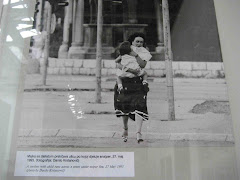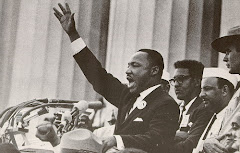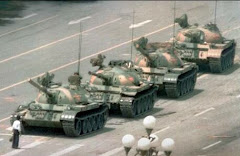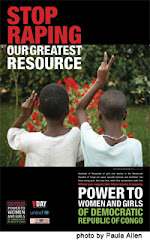Topics List: Spring 2008
- VIOLENCE, TRAUMA AND SOCIAL WELFARE COLLOQUIUM
- Week 1: Introduction and Self-Care
- Week 2: Historical and Theoretical Perspectives
- Week 3: Biopsychosocial Impact of Trauma
- Week 4: Violence Against Women
- Week 5: Religion, Race, Ethnicity, and Violence
- Week 6: Etiologies of Violence; Perpetrators of Intimate Partner Violence
- Week 7: Child Sexual Abuse; Suicide and Self-Harm
- Week 8: War, Crimes Against Humanity, and Genocide
- Week 9: Poverty and Violence in Oakland & Bayview-Hunter's Point
- Week 10: Rape as a Weapon of War; Violence Against LGBT people
- Week 11: Interventions for Trauma (with Greg Merrill)
- Week 12: Child-Parent Psychotherapy
- Week 13: Truth & Reconciliation in the Aftermath of Violence (with David Androff)
- Week 14: Violence, Trauma and Social Work (student presentations)
Wednesday, January 30, 2008
"Violence Exposure, a Chronic Psychosocial Stressor, and Child Health" Event this Thursday
THE SCHOOL OF PUBLIC HEALTH &THE SCHOOL OF SOCIAL WELFARE ANNOUNCE
The BDRI Faculty Candidate Talk
Shakira Franco-Suglia, ScD Research Fellow
Harvard School of Public Health Department of Environmental Health
"Violence Exposure, a Chronic Psychosocial Stressor, and Child Health"
THURSDAY, JANUARY 31 4:00-6:00 PM203 CALIFORNIA HALL
Dr. Shakira Franco Suglia is a research fellow in the Department of Environmental Health, Harvard School of Public Health. Her research focus is multidisciplinary as she examines the effects of social and environmental factors on children's psychological and physical health. She was recently awarded a grant from the Robert Wood Johnson Foundation to explore how social factors, both negative (i.e. housing dilapidation, economic hardship, parental stress) and positive (i.e., social support, mother-child activities), may modify the impact of psychological stressors on children's health. In 2007 she received a Minority Trainee Award by the American Thoracic Society and is currently a mentor for undergraduate and graduate students for the Society for the Advancement of Chicanos, Latinos and Native Americans in Science (SACNAS).
Presentation Topics
| Week 4 February 12 | Biopsychosocial Perspectives (continued) Ruby & Jenn Violence Against Women
Ruby |
| Week 5 February 19 | Religion, Race/Ethnicity and Violence
Jenn &:
1. Janelle
2. Anna G
|
| Week 6 February 26 | Intimate Partner Violence, Domestic Violence Perpetrators of Violence
1. Amanda
2. Kate
|
| Week 7 March 4 | Child Sexual Abuse
1. Diana
2. ___________________________________________ Suicide
1. Ronna
2. ___________________________________________
|
| Week 8 March 11 | War, Crimes Against Humanity, and Genocide Macro Ruby &:
1. Ana S
2. Jenn K. 3. Nathan 4. Natasha
|
| Week 9 March 18 | Violence, Poverty, and Crime
1. Ellen Joe
2. Reed
|
| (March 25) | (NO GROUP MEETING => SPRING BREAK!!!!)
|
| Week 10 April 1 | Sexual Violence and Rape
1. Ruby 2. ___________________________________________
Violence Against LGBTQ populations
1. Maureen
2. Reese
|
| Week 11 April 8 | Interventions for Trauma Part 1: Individual Interventions Greg Merrill
|
| Week 12 April 15 | Interventions for Violence and Trauma Part 2: Child-Parent Psychotherapy; Family Therapy Mezzo
Jenn & Ruby
|
Tuesday, January 29, 2008
SUPER BOWL (BULL?) SUNDAY?

Hi everyone -
A common "fact" that is circulated in IPV conversations is that Superbowl Sunday is the day of the highest incidence of violence against women. I was once told this by a professor of mine, and because I respected her and her creditability, I believed her.
However, upon further investigation, it appears this notion is controversial. It is a good example of examining our firmly held beliefs in regards to violence and trauma, and weighing our experience with evidence, or at least being open to alternative proposals and explanations.
Of course, there are many reasons why this assertion would make sense - alcohol, a violent sport, testosterone - all might add some apparent creditability to this claim. However, especially in the area of violence and trauma, we have to be careful about the assertions we make, and there are also those waiting in the wings with counter evidence...
Here is the story, presented from many different sides.
------------------------------------------------------------------------
A VERY critical view of this assertion can be found in the story - Super Bull Sunday
http://www.snopes.com/crime/statistics/superbowl.asp
---------------------------------------------------------------------
A Response from FAIR, the group accused of distorting the "facts" -
Is Super Bowl Sunday one of the worse days of the year for domestic violence in homes around the United States, or is it just another urban legend?
Recently, About's Urban Legend Guide David Emery, who does an excellent job of tracking the latest myths and hoaxes perpetrated on the Internet and beyond, promoted an article on Super Bowl Sunday Folklore in which he referred to the fact that more women are abused on Super Bowl Sunday than any other day as one of those "larger-than-life 'urban beliefs' in the U.S."
Emery's article pointed to Cecil "The Straight Dope" Adams' column that supposedly "debunked" the claim that domestic violence increases on Super Bowl Sunday, a story that has been making the rounds since the Super Bowl of 1993.
How did all of this controversy begin and what is the truth of the matter? Does domestic violence increase during America's unofficial national football holiday, or not?
The story began in 1993 when Fairness & Accuracy In Reporting (FAIR) convinced the NBC Television network to run a public service announcement prior to the start of the Super Bowl broadcast. The announcement warned: "Domestic violence is a crime."
Debunking the Debunkers
Shortly after the game ended a bevy of reporters, from Ken Ringle of the Washington Post to Rush Limbaugh, attempted to "debunk" FAIR's effort to call attention to a crisis that, according to the National Coalition Against Domestic Violence, claims thousands of women's lives per year.
The debunkers charged that FAIR had claimed that "national studies" supported their assertions, that FAIR made "predictions" of Super Bowl Sunday violence using false statistics, and that FAIR had "acknowledged" that its evidence was largely "anecdotal."
But FAIR denied any accusations that it distorted the facts and figures. In an article by Laura Flanders headlined Super Bowl Success Sparks Good Ol' Boys' Backlash, FAIR said when negotiating with NBC to run the PSA they referred to no national studies or statistics on the subject and made no predictions. In fact, FAIR told NBC that studies on domestic violence are gravely underfunded and understudied.
" 'Anecdotal' was the word used in countless interviews by FAIR; stories from women on the front lines were something that made the campaign stronger, not something anyone was forced to 'acknowledge,' " wrote Flanders.
What is the bottom line on this issue? Flanders' article spelled it out: "Workers at women's shelters, and some journalists, have long reported that Super Bowl Sunday is one of the year's worst days for violence against women in the home. FAIR hoped that the broadcast of an anti-violence PSA on Super Sunday, in front of the biggest TV audience of the year, would sound a wake-up call for the media, and it did."
That PSA saved lives, Flanders said.
-----------------------------------------------------------------------------
A more balanced yet still skeptical view -
From the Family Violence Prevention Fund Webpage
Domestic Violence & The Super Bowl:
The Myth
February 1, 2005
On February 6, millions of people will tune in to watch Super Bowl XXXIX. In the past, Super Bowl Sunday has been a time of public debate over the prevalence of domestic violence in our communities. At times, domestic violence experts and those working to help victims have been criticized, in part because of decade-old claims that abuse increases on game day.
Two years ago, for example, columnist and commentator George Will raised the issue on ABC’s This Week, criticizing “feminists” for spreading false information about a link between the Super Bowl and domestic violence, and telling women to “relax and enjoy the game.”
This week, the Lansing State Journal carried a column on the Super Bowl “hoax.” It said, in part, this “month brings the anniversary of feminists depicting Super Bowl Sunday as the annual high-water mark for the beating of American women by their husbands and boyfriends. Feminists find this self-evident, since on that day men celebrate the testosterone-besotted violence of professional football . . . Lies about domestic violence only serve to trivialize a serious problem.”
Others have referred to the claim that domestic violence increases on Super Bowl Sunday as an “urban myth” or a “noble lie.”
Today advocates stress that there is no conclusive evidence that domestic violence increases during the Super Bowl. “Violence against women is wrong whether it happens on Super Bowl Sunday or on any other Sunday,” said Family Violence Prevention Fund President Esta Soler. “While there have been no rigorous national studies on whether rates of domestic violence increase during the Super Bowl, we do know that women are beaten and killed every day by the men in their lives – whether there is a football game or not.”
The Myth
The Super Bowl and domestic violence probably became entwined in Americans’ minds in 1993, when advocates helped convince the NBC television network to broadcast a public service announcement (PSA) on domestic violence during its Super Bowl coverage. The PSA featured a well-dressed man sitting in a jail cell saying, “I didn’t think you’d go to jail for hitting your wife.” Afterwards, the announcer said, “Domestic violence is a crime.”
While many commentators applauded NBC’s decision to air the PSA, others claimed the network had been coerced by inflated claims about Super Bowl Sunday being “a day of dread” for battered women – a day when abuse increases. That same year, in a front page story entitled, “Debunking the ‘Day of Dread’ for Women,” Washington Post reporter Ken Ringle quoted experts and battered women’s advocates saying there was no discernible increase in battering on Super Bowl Sunday, or on any days when football games are played. Some later claimed that Ringle had taken their remarks out of context.
Conflicting Data
Although there are claims linking sports broadcasts to increased violence and abuse, no rigorous national studies have confirmed a link.
A limited study conducted by the Southern California Injury Prevention Research Center at UCLA’s School of Public Health found that football Sundays in general are not significantly associated with increased domestic violence dispatch calls.
A 2003 study by researchers at Indiana University Bloomington, which examined police reports of domestic violence incidents in 14 cities, found a small increase on Super Bowl Sunday, but the increase was much smaller than on holidays such as Christmas or Memorial Day.
Athletes and Violence
Due in part to incidents of violence involving Kobe Bryant, University of Colorado football players and other athletes, public attention may once again turn to the link between professional sports and violence against women this week.
“Because professional athletes are so much in the public eye, if they do commit violence against women, the media tends to report it,” said Soler. “But, as public figures, athletes are in a unique position to take a stand against violence, and many are doing just that. We commend the professional athletes who are helping to raise awareness about abuse and doing their part to end violence against women and children.”
----------------------------------------------------------------------------
MOST RECENT RESEARCH
A 2008 study at Indiana Bloomington University found that the relationship between televised football and DV might be less prevalent than previous reports would suggest...actually they found that ANTICIPATION of a game, rather than the game itself, may be associated with domestic violence...
Part of the reason this link may have been made also involves the studied relationship between soccer games in Europe and violence. However, although it was hypothesized that the LOSERS would be more violent, a study suggests that it is actually WINNING that promotes incidents of violence...!
http://injuryprevention.bmj.com/cgi/content/full/11/2/69
----------------------------------------------------------------------
So, what do you think?
Definitions
As you can already see, definitions of trauma are definitely topics of lively debate. Here are the clinical definitions we brought up in class. Please free to post definitions you've found, or your own thoughts on the issue. For example, is oppression trauma? When could a person experience trauma, and not PTSD? Who would recognize this and how would it be assessed? Is poverty trauma? Death of a loved one? What is the difference between trauma and grief?
ALSO, see
http://www.veteransresources.org/forums/showthread.php?t=1197
for some thoughts on new definitions of PTSD in the DSM V!
-----------------------------------------------------------
DSM-IV-TR Criteria for PTSD
Diagnostic Classification of Mental Health and Developmental Disorders of Early Childhood Revised Edition (DC:0-3R).
Includes the above as well as a "serious threat to the physical or psychological integrity of the child" Definition now on bspace in pdf form.
The ICD-10 Classification of Mental and Behavioural Disorders
World Health Organization, Geneva, 1992
--------------------------------------------------------------------------------
F43.1 Post-Traumatic Stress Disorder
Monday, January 28, 2008
1984 Anti Sikh Riots
News came out just a few days ago on the BBC that 11 life sentences were passed to those connected with the
If you have not heard of the anti-Sikh riots of 1984 do not be surprised. Books about the topic are impossible to find. Television shows and movies are heavily censored within
First of all we have to take into consideration what were the consequences for the government which inflicted this genocide? Unlike many other governments, leaders in the Congress party of
The anti-Sikh Riots of 1984, which was followed by 10 years of human rights violation in the northern state of
Here are a few documentaries that explain the background:
This one is the beginning of a series called 1984 Sikhs' Kristallnacht. It gives a good background on the lead up to the 1984 riots as well as a good description on what had happened.
This one is a second part of the five part series which goes into further detail on the riots.
The second video is a 45 minute documentary called “Storming the
Wednesday, January 23, 2008
Room Change!
The group study will now meet in Haviland 2.
Tuesday, January 22, 2008
"Survivor Stories" Film Series
The films correspond with several areas of focus which the group study will be researching over the semester, and viewing the films together will enrich the students' learning experiences. There will be time for debriefing and discussion after each film and resources for how people can get involved with solutions at a variety of levels.
Films will be shown on Tuesdays from 5-7pm at the Media Resource Center, in the basement of Moffitt library (Group Viewing Room B).
February 5
 Alive Day Memories: Home From Iraq
Alive Day Memories: Home From Iraq In a war that has left more than 25,000 wounded, Alive Day Memories: Home From Iraq looks at a new generation of veterans. Executive Producer James Gandolfini interviews ten Soldiers and Marines who reveal their feelings on their future, their severe disabilities and their devotion to America. The documentary surveys the physical and emotional cost of war through memories of their "alive day," the day they narrowly escaped death in Iraq.
February 12
 Until The Violence Stops
Until The Violence Stops Until the Violence Stops features playwright and activist Eve Ensler in a powerful film that documents how The Vagina Monologues grew into an international grassroots movement called V-Day to stop violence against women and girls. In 2002, eight hundred cities around the world participated in V-Day by staging benefit performances of The Vagina Monologues. Until the Violence Stops shows women from Harlem to Ukiah, California; from the Pine Ridge Indian Reservation to the Philippines and Kenya, uniting and courageously revealing their intimate and deeply painful experiences with abuse ranging from rape to female circumcision.... More than just testimonies and performances, Until the Violence Stops is a film about empowerment and the importance of dialogue in the healing process. A celebration of women reclaiming their bodies and lives, this moving documentary leaves us with hope that change can happen.
February 25
 Lost Boys of Sudan
Lost Boys of Sudan Lost Boys of Sudan is a feature-length documentary that follows two Sudanese refugees on an extraordinary journey from Africa to America. Orphaned as young boys in one of Africa's cruelest civil wars, Peter Dut and Santino Chuor survived lion attacks and militia gunfire to reach a refugee camp in Kenya along with thousands of other children. From there, remarkably, they were chosen to come to America. Safe at last from physical danger and hunger, a world away from home, they find themselves confronted with the abundance and alienation of contemporary American suburbia.
March 11
 Ghosts of Rwanda
Ghosts of Rwanda "Ghosts of Rwanda," a special two-hour Frontline documentary to mark the 10th anniversary of the Rwandan genocide -- a state-sponsored massacre in which some 800,000 Rwandans were methodically hunted down and murdered by Hutu extremists as the U.S. and international community refused to intervene -- examines the social, political, and diplomatic failures that converged to enable the genocide to occur.... Through interviews with key government officials, diplomats, soldiers, and survivors of the slaughter, "Ghosts of Rwanda" presents groundbreaking, first-hand accounts of the genocide from those who lived it: the diplomats on the scene who thought they were building peace only to see their colleagues murdered; the Tutsi survivors who recount the horror of seeing their friends and family slaughtered by Hutu friends and co-workers; and the U.N. peacekeepers in Rwanda who were ordered not to intervene in the massacre happening all around them. The documentary features interviews with Canadian Gen. Romeo Dallaire, U.N. Secretary-General Kofi Annan, former Secretary of State Madeleine Albright, former U.N. Secretary-General Boutros Boutros-Ghali, and former National Security Adviser Anthony Lake as well as haunting interviews with the Hutu killers themselves, and a powerful interview with BBC journalist Fergal Keane who travelled through Rwanda as the genocide was drawing to a close
April 1
 Grbavica: Land of My Dreams
Grbavica: Land of My DreamsThis is a Bosnian film about the aftermath of sexual violence and war, even many years later. It won many film awards, including a Golden Bear at the Berlin film festival. The plot summary is: Sara (Luna Mijovic) is a young girl whose class plans to go on a school trip. Since children of fallen warriors in the last war are not suppose to pay, Sara thinks that she is one of them (because her mother told her that her father got killed in war). Esma (Mirjana Karanovic), her mother Esma has two things to deal with: the explanation to her only child that she was raped-- that Sara's father is not a fallen warrior, and she has to collect the money for her daughter to go to the school trip. Esma gets a job as a waitress at a nightclub and is confronted with memories and fears from the past as Sara becomes increasingly rebellious and demanding of information about her father.
April 15
 Beyond the Call
Beyond the CallIn an Indiana Jones meets Mother Teresa adventure, three middle-aged men, former soldiers and modern-day knights travel the world delivering life-saving humanitarian aid directly into the hands of civilians and doctors. Ed Artis, James Laws and Walt Ratterman inspire through deeds not words, in some of the most dangerous yet beautiful places on Earth, the front lines of war. Knightsbridge International is a unique humanitarian organization, whose motto is "High Adventure and Service to Humanity." They explain, "We're not there to change anybody's politics, we're not in the God business, and we pay our own way." They add simply, We do what we can, when we can, because we can.
Monday, January 21, 2008
Honoring Dr. Martin Luther King, Jr.
I spent some time watching videos and listening to his words, and I am happy to share some of the most inspiring ones I found with you. I will also spend some time in quiet contemplation to cultivate compassion and peace in my own heart. Listening to Dr. King's words strengthens my commitment to pursuing social justice causes through nonviolent means. I hope you find some truth or inspiration here.
I look forward to meeting everyone tomorrow at our first meeting of the Violence and Trauma Group Study!
MLK - A Knock at Midnight
Here MLK talks about how he endured the persecution he and his family experienced in retaliation for his civil rights work.
His Last Speech, "I've Been to the Mountaintop"
Prophetic words, he was assassinated the next day.
Martin Luther King on War
From Birmingham to D.C.
This video follows Dr. King from the movement in Birmingham to DC. Highlighting his speeches in 1963 and ending with his last speech in 1968. Set to music by DeVotchKa "How It Ends."
In The Name of Love
In memory of MLK...slideshow set to U2's "Pride(In The Name of Love)."
Early morning, April 4
Shot rings out in the Memphis sky
Free at last, they took your life
They could not take your pride
In the name of love
What more in the name of love
Saturday, January 19, 2008
Monday, January 14, 2008
Readings for Week #1
We'll be talking about self-care during the first class. Here you can view the first few pages of the book we're focusing on during week 1. We'll provide a hard copy of the chapter for the first day of class, but you might want to take a quick look ahead of time.
Stamm, BH. (1999). Secondary traumatic stress: Self-care issues for clinicians, researchers, and educators. MD: Sidran Press. Assigned Readings: pps. 3-28.
http://www.amazon.com/Secondary-Traumatic-Stress-Clinicians-Researchers/dp/1886968071
We will be talking more about these next 2 in the second week, but here they are for your convenience. These readings for the first week are are on bspace, but here are some quick links for your ease:
NASW. (1999). Code of Ethics.
http://www.socialworkers.org/pubs/code/code.asp
World Health Organization Report on Violence and Health. (2002). (Just the summary, not the whole thing)
http://www.who.int/violence_injury_prevention/violence/world_report/en/
Sunday, January 6, 2008
War Veterans and Posttraumatic Stress
Hero After War: Combat Vets and PTSD
We are more aware of what PTSD is now because of the occupations of Iraq and Afghanistan. Vietnam veterans are now reporting for treatment of their own wounds they thought they escaped. These occupations have brought out memories they have had to deal with for over thirty years and now they need help. Both the older generation and the new generation of veterans are reaching out and helping each other heal. It can be done but the rest of us cannot just stand by and watch. They need our help.
Talking Post Trauma Blues (PTSD)
What's going to happen when our "hidden injuries" run out of places to hide?
A Talking Blues about Post Traumatic Stress Disorder (PTSD). Studies suggest that one out of four coming home from Iraq and Afghanistan bring with them PTSD or PTSD related problems. For an online PTSD support forum, see:
http://www.ptsdforum.org/
Tuesday, January 1, 2008
Dr. Alicia Lieberman Colloquium
Alicia F. Lieberman, PhD is the Irving B. Harris Endowed Chair in Infant Mental Health and Vice Chair for Academic Affairs at the UCSF Department of Psychiatry, and Director of the Child Trauma Research Project at San Francisco General Hospital. She is a clinical consultant with the San Francisco Human Services Agency. She is active in major national organizations involved with mental health in infancy and early childhood. She is president of the board of directors of Zero to Three: National Center for Infants, Toddlers and Families, and on the Professional Advisory Board of the Johnson & Johnson Pediatric Institute. She has served on peer review panels of the National Institute of Mental Health, is on the Board of Trustees of the Irving Harris Foundation, and consults with the Miriam and Peter Haas Foundation on early childhood education for Palestinian-Israeli children.
Dr. Lieberman will discuss Child-Parent Psychotherapy (CPP) as a treatment method for young children who have been exposed to violence. She will be responsive to the interests of the group, so perhaps we can prepare some questions or topics before the colloquium for her to address. There will also be time during the event for questions and discussion.
Who Are You? (check all that apply)
How did you find this blog?
Links to Browse & Buy Books
Trauma and Recovery

by Judith Lewis Herman
Don't Hit My Mommy
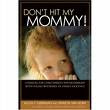
by Alicia Lieberman and Patricia Van Horn
Violence: A National Epidemic

by James Gilligan
Ayaan Hirsi Ali
- Submission Part 1 (a short film in which the words of the Koran are written on women's bodies as they speak their stories of violence and trauma)
- "Infidel" (her autobiography of growing up a refugee and becoming a member of the Dutch Parliament)
- "The Caged Virgin" (her essays about women and Islam)
- Ayaan's Personal Web Page
- Wikipedia (good summary of her life, philosophy, and work)
Submission
Ayaan Hirsi Ali

from the cover of "Infidel"
